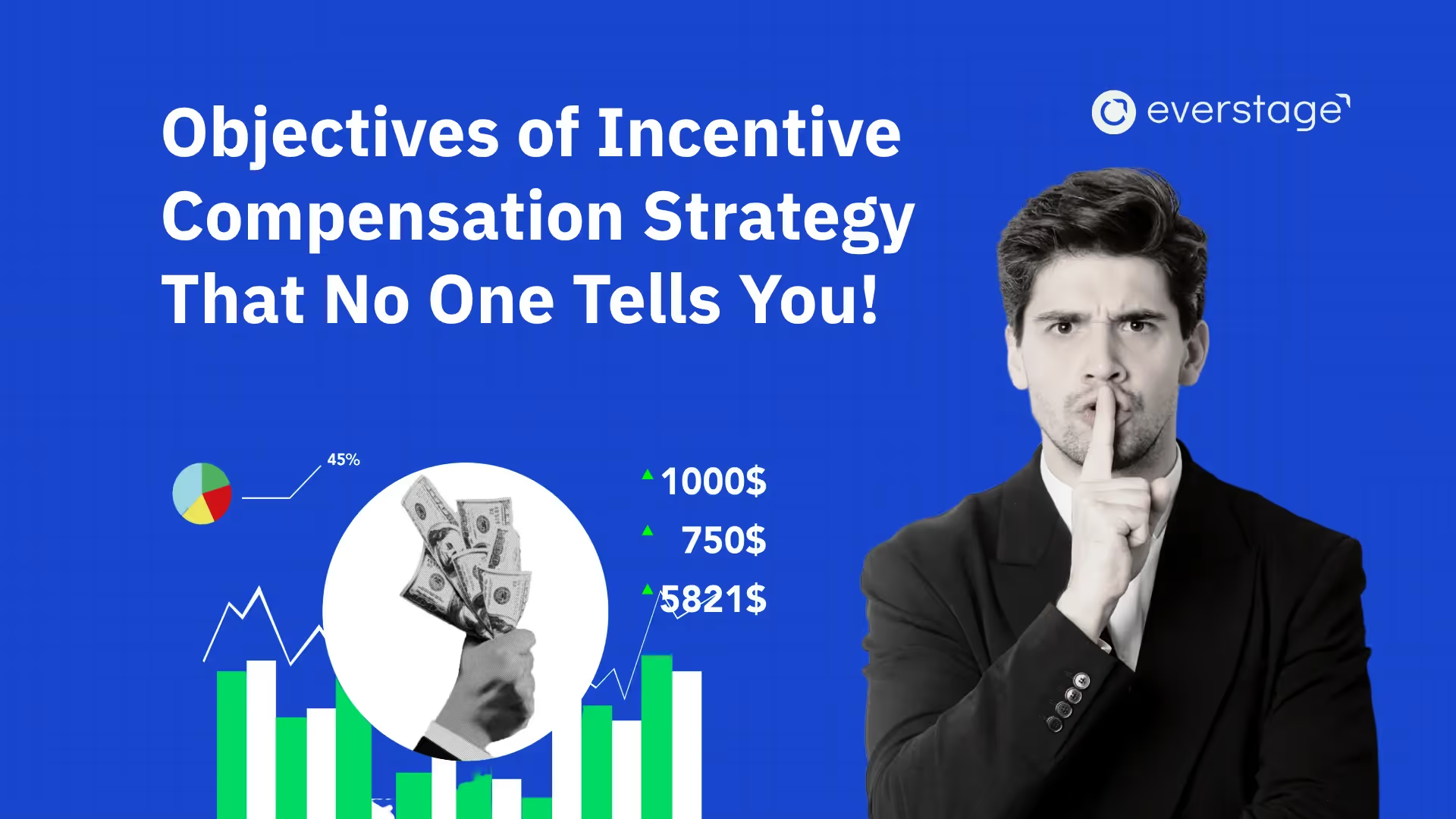If you list down the top five things that motivate your employees, incentive compensations are sure to top the list. That’s why it’s crucial to create an incentive compensation plan, which can also be the driving factor in taking your business forward.
Let’s look at it in detail.
What is a Compensation Plan?
A compensation plan is an outline that gives clarity on how the reps will be paid for their efforts. This can include wages, salaries, bonuses, commissions, and other forms of incentives.
Here, incentive-based compensation is the additional variable pay that the employees earn for achieving their individual goals (closing a certain number of deals, selling a certain number of products, etc), or as reward for the overall performance of a team.
Employee Compensation and its Main Components
Employee compensation is the total amount of payment that an employee receives in various forms for their service to the company.
The main components of employee compensation plans are:
- Salaries
- Wages
- Benefits
- Commissions
- Rewards
Why Do Companies Need a Compensation Plan?
Companies need talents who can get the job done for them, thereby helping them generate more revenue. To remain competitive, and to attract and retain the best talents, every company would need a well-defined sales compensation plan. Without such plans, companies would eventually lose track, and cannot go on to achieve what they wanted to.
The right incentive compensation plan can help managers to:
- Align revenue targets with incentives and prioritize the most important deals.
- Find the gap between high-performing and low-performing sales reps and fix them.
- Create a structure within the team and have clarity on the individual’s role.
- Motivate and manage the team efficiently.
Who Owns Incentive Compensation?
This is what the numbers reveal as per a survey conducted by the ‘Alexander Group’. In around 40% of the organizations, the incentive compensation is owned by sales operations and sales management. Compensations may also be owned by other disciplines such as human resources, finance, or the division leader (CEO, COO, president, or general manager) depending on the type of industry.
While sales operations are responsible for redesigning incentive plans periodically, they are also responsible for program management. Though, approving the plan structure is done by the leaders, like the CEO, COO, or president, in most of the organizations.
How is Employee Compensation Calculated?
In simple terms, the total compensation of an employee is the sum of every main component of a compensation plan, which includes base salary, benefits, commissions, and other bonuses.
What are Direct and Indirect Compensation?
Direct Compensation: Direct compensation is the money paid to the employees for their work. Salary, hourly wages, commissions, bonuses, all come under direct compensation. While hourly wages & salary are the base pay, commissions & bonuses are the variable pay, which majorly depends on the decisions of the employer.
Indirect Compensation: Indirect compensation doesn’t involve direct cash, but the benefits that the employers offer, like medical, dental insurance, retirement plans, etc. Indirect compensation can also include company stock and profit-sharing in some cases.
What are the Four Direct Types of Compensation?
Hourly compensation
In this type of direct compensation, the employees are paid an hourly rate, which is applicable for employees who’re treated as non-exempt. They’re also eligible to get paid overtime, which is 1.5 times their hourly rate for every hour they work past 40 hours per week. In general, the employees keep a track of their work hours by using a timecard, or in any other method as instructed by the employer. \
Salary compensation
This is one of the most common types of direct compensation, where the employees are paid a fixed salary over a period of time (weekly, monthly, or annually). Exempt employees are mostly paid in this way, and they’re not eligible for overtime pay. Their salary is for the work they do for the company and may vary depending on the job position.
Compensation based on commission
This type of compensation determines the variable pay that the employee receives for the work they’ve done. Sales reps are generally paid in a manner where their commission depends on the target they achieve over a specific period of time. The target can typically be, the number of products sold, the amount of profit generated, etc.
Learn in detail about how commissions are calculated here.
Compensation based on bonuses
This is another compensation method that is associated with the variable pay, where the employees are paid bonuses based on their performance. An example of this can be, if a sales professional exceeds his quarterly quota, they may receive a bonus to keep them motivated. In some cases, employees may receive bonuses when their company reaches a milestone.
Types of Variable Incentive Compensation
Sales commission structures
Commission structures are common among industries that have variable pay structures. Sales reps are paid based on their On-Target Earnings (OTE), which include base pay and variable pay. Sales commission structures determine the variable compensation that the reps receive.
There are many different types of commission structures, which are explained in this article.
Sales Performance Incentive Fund (SPIFs)
SPIFs are incentives that are used to boost sales performance in a short period of time. It is used when sales targets for a specific product are not met or need to be improved. You should begin the process by identifying the purpose of why you want to introduce SPIFs and set the right targets for your employees to get the incentive.
You should also keep in mind a few fundamental rules when creating SPIFs, which are detailed out here.
Bonuses:
Bonuses play a major role in motivating the employees towards achieving a specific goal. Employees are rewarded with a certain amount of money, which is the bonus, for reaching the target set by the company.
MBOs:
MBOs or Management by Objectives is the performance-based incentives awarded to an employee for achieving their individual goal that’s set by their manager. The goals can vary depending on the position of the employee, and this method can be used to incentivize non-sales people as well.
Key Incentive Compensation Software Features
For effective management of the incentive plan that can actually take your business forward, the following features should be part of the solution.
‘What-if’ scenario modeling
This method helps managers to identify the impact of potential changes that come with the plan. In this way, the sales managers can take an informed decision before rolling out the plan to the sales team. When a sales incentive technology provides scenario planning capabilities, it helps to keep your plans as flexible as possible and adapt easily to the market changes.
Rapid calculation
Ever faced a bottleneck in calculating payouts for your reps? Did that stop you from focusing on other important tasks? This is why it’s vital to have incentive technologies that calculate commissions in no time, with high accuracy, and should also help in resolving disputes as and when they arise. That’s not all, it should also ensure the on-time payment of commissions.
Real-time insights that drive performance
The incentive management platform you use should serve you with real-time data so that you can alter your plan and make decisions as per the insights gathered. This can also influence your upcoming strategy, like a change of territory to focus, additional no. of reps required, change in incentive plan structure based on individual performance, and so on.
How to Manage an Incentive Compensation Program?
You need to take care of the following steps to keep your incentive compensation plan effective.
Reporting: You’ve to make reports all through the year to make sure that your plan can actually bring a difference to your business. One aspect of good reporting is that your stakeholders get varying levels of details from it. All your stakeholders must access the same report for uniformity in decision making.
Ongoing communication: Without proper communication from managers, your reps cannot understand what’s expected of them. This is why it’s crucial to keep your communication clear and consistent throughout the process. Presentations, FAQ documents, and how-to videos can also be used to make your communication effective.
Postmortem: Your plan has been running for a few months, you’ve made some minor changes to it in the meantime. What next? Stakeholders should come together to review what went well, and what are the common problems faced with the plan.
Program updates: Using the information gathered in the postmortem process, you can redefine the factors that influence your plan, and bring changes to the management process.
Ongoing plan changes: Constant refining of the incentive plan is vital for every company, which can be based on the changes in your strategy, shifts in the market, and a few other factors. What’s even better is to make the necessary changes to your plan as and when it’s needed, rather than doing it on an annual basis.
System and tool upgrades: Your incentive management platform should be adaptive (so that you can easily make changes in plans) and handle processes that involve lots of data like forecasting, sizing, and deployment, performance management, etc.
Methods for Optimizing an Incentive Compensation Plan
Your plan should help you reach your business goals: You’ve to consider the overall business objectives and create plans that would drive the sales team to achieve those goals.
The reward for improvement: While you generally pay your reps for hitting the target, you can also consider encouraging them with rewards for improvements. This can include paying for behaviors that will make the sales team more effective.
Leverage technology to increase the capabilities of your plan: Utilize the technological advancements to your advantage, and create robust compensation plans. An example for this can be, your plans can include how you want to incentivize your reps in different regions, for the various sales behaviors, and for the performance across levels.
Advantages of a Fair Compensation Plan
Creating a fair sales compensation plan is crucial for your business, and can impact the growth of the organization. The right compensation plan is simple, yet flexible, and transparent. Some of the benefits of one such plan are:
- You attract top talents
- It motivates your employees.
- Makes your employees feel satisfied with the job they do
- Improves employee morale
- Let the employees know how valued they are.
Final thoughts
When you’re in a position to design a compensation plan, it’s completely fine to take the time you need to get it right rather than coming up with one in a hurry. For, what’s really important is that you’ve to attract the right talents who can help your business grow. Make sure to keep a track of current market trends and keep updating your compensation plan regularly.




.avif)
.avif)


.avif)
.avif)

